2024 ANNUAL REPORT
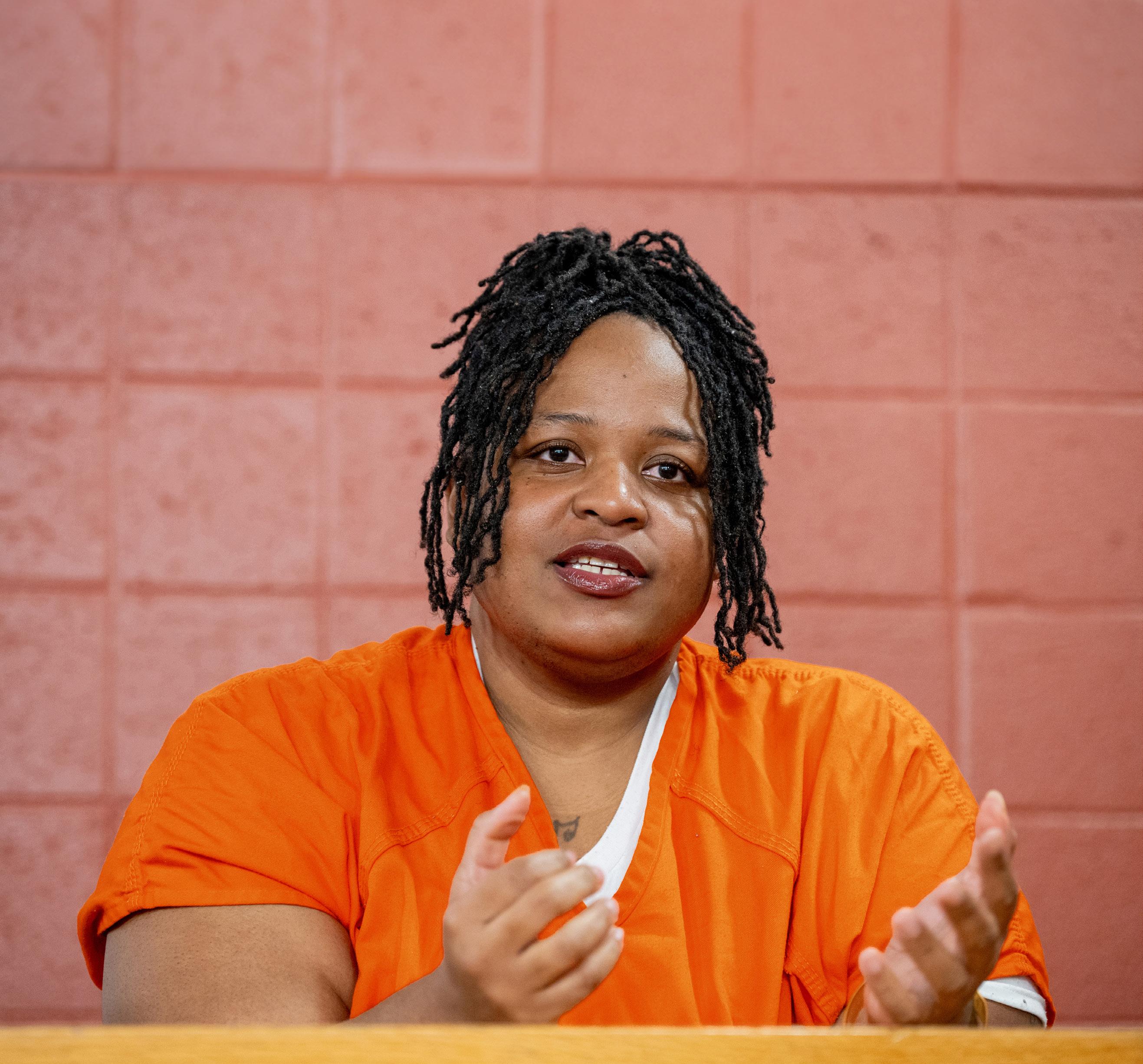
Commissioner Shameka Hayes, a Prisons Scholars Program participant and the first incarcerated woman to hold public office in Washington, D.C.

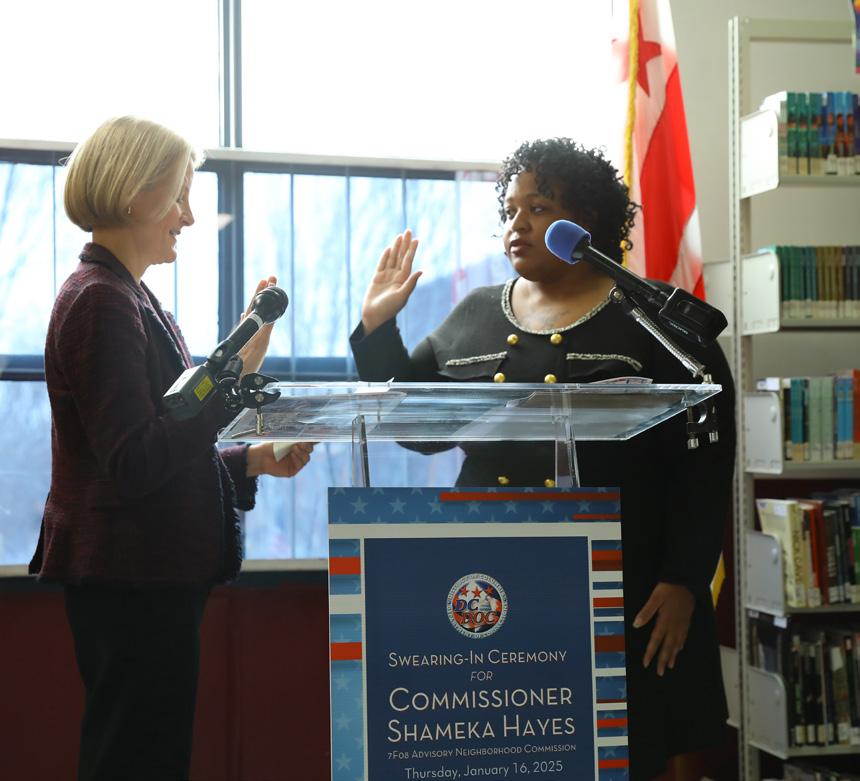
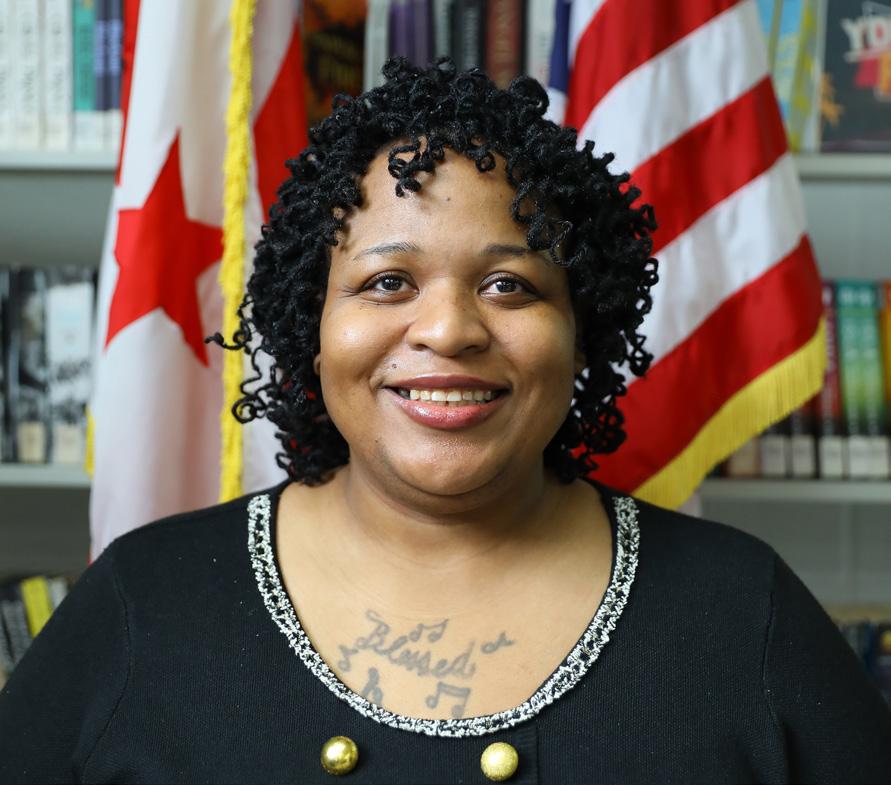



Commissioner Shameka Hayes, a Prisons Scholars Program participant and the first incarcerated woman to hold public office in Washington, D.C.




In 2024, we made remarkable progress toward our goal of connecting individuals affected by mass incarceration with opportunities to shape their own future. Each day, I am inspired by the sheer resilience and commitment to success that our program participants possess. Whether I’m walking down the halls of the Prisons and Justice Initiative (PJI) building — where reentry program fellows are engaged in classroom discussions — or celebrating yet another successful semester with the Prison Scholars Program at the D.C. Jail, I see firsthand how education and opportunity can change lives.
Throughout the year, we celebrated both individual and collective achievements within the PJI community. In September, thirteen Mayor’s Office on Returning Citizen Affairs (MORCA)-Georgetown Paralegal Program fellows, with aspirations of changing the landscape of the legal profession, successfully completed the program through Georgetown University Law Center. They were joined by keynote speaker, CNN’s Jake Tapper, who emphasized the importance of programs like ours in helping individuals rebuild their lives.
The Prison Scholars Program also expanded in many exciting ways. The program launched its first-ever foreign language course — Introductory Spanish I. We also witnessed history as Shameka Hayes became the first incarcerated woman to hold public office in Washington, D.C. Since joining the Georgetown Prison Scholars Program in the fall of 2022, Hayes’s growth and commitment to excellence have inspired many.
The Bachelor of Liberal Arts (BLA) program continues to grow, providing students the opportunity to earn a Georgetown University degree. The program hosted its first-ever poetry event that showcased students’ literary works of art. Twenty students participated in the end-of-semester event, and we hope to continue it for years to come.
The Georgetown Pivot Program now has a total of 80 graduates — many of whom have gone on to build successful businesses and careers.
Making an Exoneree also reached major milestones, as the program recently expanded to three additional universities (Princeton, New York University, and the University of California, Santa Cruz) and celebrated its eleventh prison release, further demonstrating the power of student-driven advocacy.
You’ll find these stories and more in our 2024 Annual Report. Thank you to everyone who has supported our work — we couldn’t do this without you!
Sincerely,
Marc Howard




Reentry
Paralegal Program Graduates! Spotlight: Nicole Johnson
Pivot Graduates!
Tariq Gaston

The Prisons and Justice Initiative is dedicated to creating pathways for those impacted by the criminal legal system to rebuild their lives. Since its founding in 2016, PJI’s mission is to empower currently and formerly incarcerated people by providing access to education and employment and by advocating for just outcomes in the legal system. We aim to support people as scholars, professionals and leaders who can break cycles of incarceration and strengthen our communities.
Through reinvestigating wrongful convictions, creating impactful prison education programs and providing crucial reentry services, PJI is dedicated to addressing the most pressing needs of incarcerated and formerly incarcerated individuals.

*As of December 31, 2024
4 wrongfully convicted Making an Exoneree program participants were released from prison
OVERALL
56 Prison Scholars Program students participated in at least one course at the D.C. Jail
13 fellows graduated from the Paralegal Program
14 fellows graduated from the Pivot Program 91% of reentry program graduates were employed within three months of graduation
61 students are currently enrolled in the BLA program at Patuxent Institution in Maryland

Overview
Since its launch in 2018, the Prison Scholars Program has provided over 300 incarcerated individuals at the D.C. Jail with access to a high-quality education. The program offers credit-bearing and non-credit classes year round, as well as a weekly lecture series with distinguished guest speakers.
The Prison Scholars Program continues to expand its academic offerings, providing an immersive educational experience for incarcerated students. This year marked a significant milestone with the launch of Introductory Spanish I, the program’s firstever foreign language course. Students also participated in lectures with undergraduates and professors visiting from Georgetown’s College of Arts and Sciences. Dr. Rebecca Boylan brought students from her English course, Writing As Advocates and Allies, to explore themes of courageous activism and imagining truth. Dr. Carla Shedd brought students from her sociology course, Law and Society, to discuss the ever-changing landscape of technology and its effects on society and law-making.
Collaborative coursework with Georgetown undergraduates fosters a learning environment that bridges the gap between campuses and creates meaningful academic exchanges. Building on the success of its Public Policy in America course, piloted in partnership with the McCourt School of Public Policy, students in the spring of 2025 will have the opportunity to participate in another new course offering titled Disability in Public Policy. Through this significant collaboration, the program can continue to introduce students to policy-focused curriculum, offering a deeper understanding of the legal and political systems that shape United States policy. The program curriculum remains diverse and dynamic, featuring classes across disciplines such as performing arts, justice and peace studies, computer science, public policy, journalism, finance and the humanities.

Other landmark achievements in 2024 include the expansion of the Prison Scholars Program to additional units within the D.C. Jail. This evolution allows Georgetown to offer education to society’s most vulnerable populations. Students were also able to experience two private film screenings, "Kemba" in collaboration with Black Entertainment Television and Justice Policy Institute, and "District of Second Chances," courtesy of Families Against Mandatory Minimums.
Many students credit the program for changing their lives. “My life has turned around, and I have a completely new outlook and drive to move on,” says John Moore, Prison Scholars Program alumnus.
• Expressive Communication Through the Performing Arts: Justin Alexander Gordon, Assistant Director, Racial Justice EnActors
• Storytelling for Social Change: Tirrea Billings, Adjunct Lecturer
• American Drama: Katy Ryan, Ph.D., Director of Education, Prisons and Justice Initiative
• Forgotten Humanity of Prisoners: Marc Howard, Ph.D., Founder, Prisons and Justice Initiative
• Personal Finance: Michael G. Ryan, Adjunct Professor of the Practice, Interdisciplinary Programs (Central Detention Facility)*
• Journalism, Current Affairs, and Personal Relations: Neil Roland, Award-Winning Veteran Journalist*
• Introductory Spanish I: Sebastián Patrón Saade, Ph.D., Assistant Teaching Professor
• Web Design I: Marisa Gaetz, Co-founder of Brave Behind Bars, Massachusetts Institute of Technology
• Presentation Skills: Bruce Clarke, Author and Former Criminal Defense Attorney*
• Public Policy in America: Jasmine Tyler, Policy Innovation Lab Director and Adjunct Lecturer
• The Problem of God: Mehmet Sayilgan, Ph.D., Assistant Teaching Professor
• Writing for Professionals: Elizabeth Catchmark, Writing Center Director and Assistant Teaching Professor
• African Politics: Travis Adkins, President and CEO of the U.S. African Development Foundation, Adjunct Lecturer
• Personal Finance: Michael G. Ryan, Adjunct Professor of the Practice, Interdisciplinary Programs
• Journalism, Current Affairs, and Personal Relations: Neil Roland, Award-Winning Veteran Journalist*
*non-credit
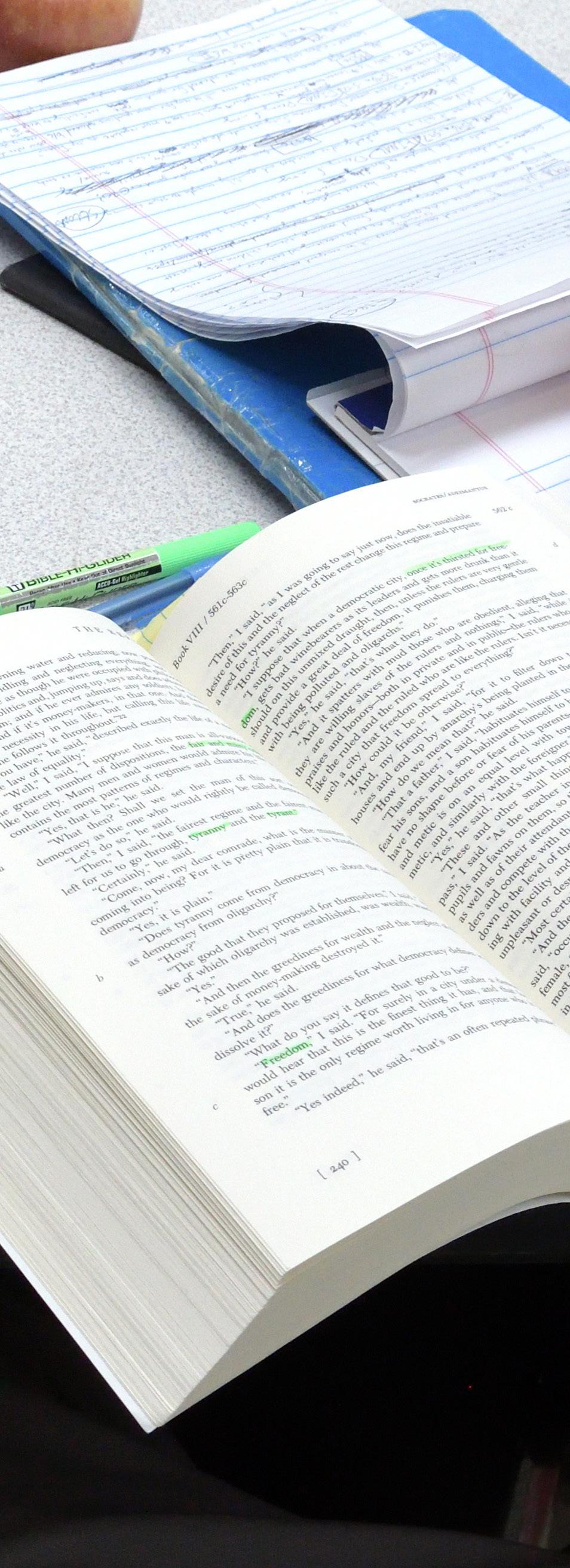
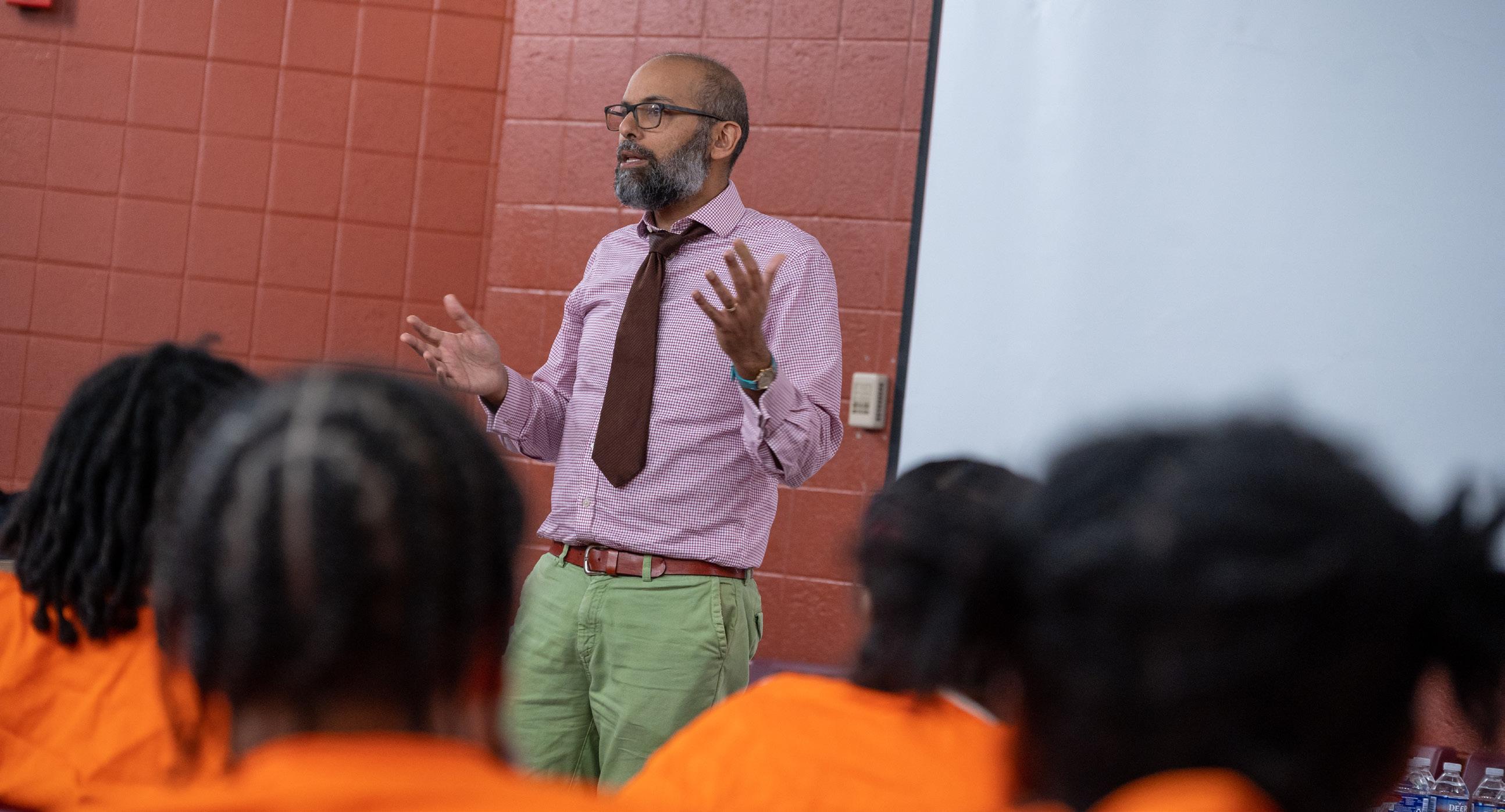
ZIA FARUQUI
U.S. Magistrate Judge
SHERIDAN HOTUNGPICKERAL
Certified Academic Language Therapist
MANNONE BUTLER
Head of Program and Partnerships, National Basketball Social Justice Coalition
REBECCA BOYLAN, PH.D.
Adjunct Lecturer
ALBERTO DE SIMONI
Assistant Teaching Professor, North Carolina State
NICOLE JOHNSON, KENDRA YOUNG, AND JASMINE JOYNER
MORCA-Georgetown Paralegal Graduates
EMILY CASSOMETUS
Senior Counsel Ward 4, and ANAIAH MITCHELL
Legislative Policy Advisor Ward 2 – DC Council
CHARLOTTE WEST
National Reporter, and AZIA ROSS, HBCU Fellow –Open Campus Media
SHOSHANA PERRY
Mindfulness Educator and Narrative4 Master Practitioner
JAMILA WHITE
Former Advisory Neighborhood Commission Ward 8, Founder, BlakQuity
MARK FORD
MORCA-Georgetown Paralegal Program
ROY AUSTIN
VP of Civil Rights and Deputy Counsel, Meta
TRAVIS ADKINS
President and CEO of the U.S. African Development Foundation, Adjunct Lecturer
ARLANDO TRAY JONES III
Author and Public Speaker, Program Associate, Prisons and Justice Initiative
CHRISTOPHER KING, PH.D.
Associate Professor and Dean of the School of Health
BRIAN FERGUSON
Senior Advisor to the President for Racial Justice Initiatives
TOM VOZZO
Author and CEO of Homeboy Industries
KEMBA SMITH
Author, International Public Speaker, and JASMINE TYLER
Policy Innovation Lab Director and Adjunct Lecturer –Kemba Film Screening
CARLA SHEDD, PH.D. Associate Professor
JULIA KELEHER, ED.D., MBA, PMP
Author and Educator
ALFRED MILLER
Paralegal, Neighborhood Legal Services Program, and DEE FARMER
Executive Director of Fight4Justice Project, Paralegal Graduate
DABNEY L. FRIEDRICH
U.S. District Court Judge
WYNETTE YAO
Award-Winning Filmmaker, and
COLIE LEVAR LONG
Prison Scholar Alum and Program Associate, Prisons and Justice Initiative – District of Second Chances Film Screening
ANNALISA BUTTICCI, PH.D.
Assistant Professor
DOIREANN RENZI, PH.D.
Assistant Director of Faculty Initiatives

On January 11, 2024, Shameka Hayes made history as the first incarcerated woman to hold public office in Washington, D.C. Sworn in as commissioner for Ward 7’s Advisory Neighborhood Commission (ANC), she became only the third incarcerated person — and the second Georgetown Prison Scholar — to serve in this role.
When Hayes joined the Georgetown Prison Scholars Program in the fall of 2022, she wasn’t thinking about leadership. She wasn’t planning to run for office. She just wanted something — anything — to keep her mind engaged.
“I just wanted to stay sane and keep learning,” she said.
She had no idea that two years later, she’d be sworn in as the first incarcerated woman ever elected to public office in Washington, D.C.
When Hayes started taking Georgetown classes, she wasn’t sure what to expect. She knew she liked to read and liked to learn — but this was different.
One class dove into the complexities of African politics. Another unraveled the history of Washington, D.C. itself. Then there was DC Noir with Professor Maurice Jackson, a course that made her rethink the stories that get told — and the ones that don’t.
“We learn so much about different forms of life,” she said.
“One day it’s mental health, the next it’s a playwright. It keeps your brain moving.”
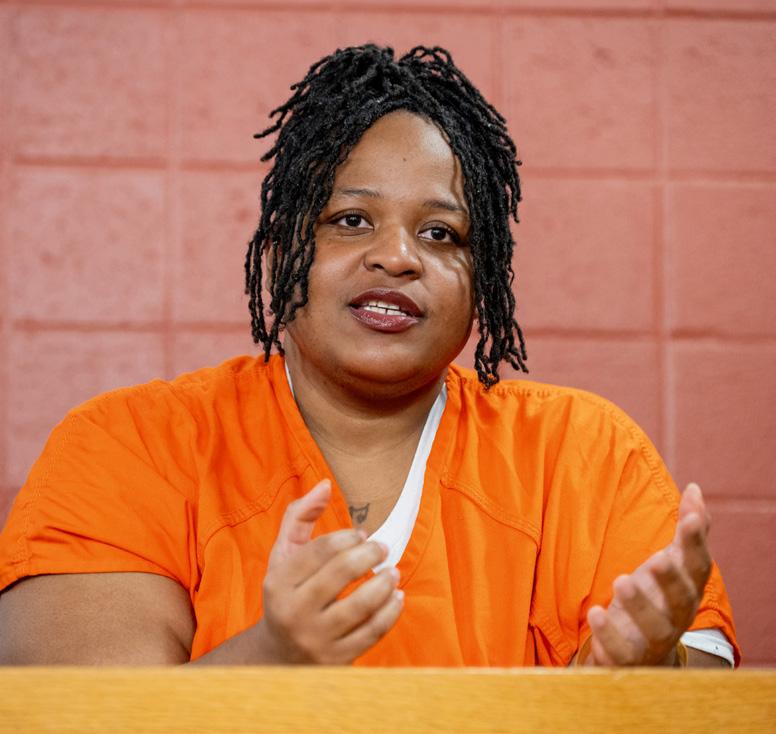
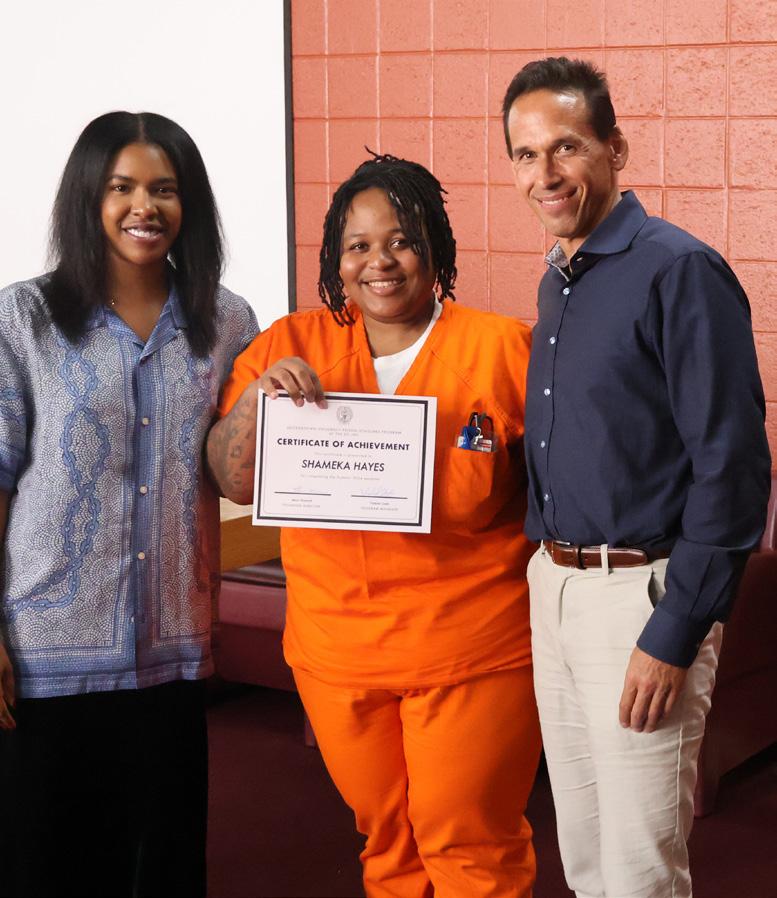
It wasn’t just what she was learning — it was how she was treated.
“The Georgetown professors and staff treated us like scholars first, not inmates,” she said. “That changes you.”
By 2023, something had shifted. Hayes had grown more confident, more vocal.
She saw firsthand the stark difference between resources for men and women inside the jail. Men had more access to programs, more educational opportunities, even basic facility maintenance. Women were left behind.

She could complain about it — or she could do something about it.
The idea of running for ANC commissioner was intimidating. The position represented more than the jail — it included the Harriet Tubman Women’s Shelter, and even the correctional officers who worked inside the facility. It was a big responsibility. And on top of that, no woman inside the jail had ever been elected before.
“I second-guessed myself so many times,” she said. “I was stepping into a male-dominated space. I didn’t know if I was ready.”
After long conversations with her mother, she decided to go for it. She spent months preparing, talking with her peers and shaping her platform.
Then, she won.
“It was unbelievable,” she said. “I was elected by my peers in a carceral space. That’s not lost on me.”
As ANC commissioner, Hayes is pushing for equity for everyone in her district.
“I just want to make sure everyone gets represented,” she said.
She’s fighting for better educational programs, more resources for incarcerated women and stronger connections between the jail and the outside community.
Her passion for advocacy was sparked in the classroom, and she credits the Georgetown Prison Scholars Program for giving her the confidence to lead. She remembers listening to Joel Castón — the first incarcerated ANC commissioner and Georgetown Prison Scholar — speak in 2023. That moment made something click.
“It reminded me that life doesn’t end just because you’re in here,” she said. “There’s still so much you can do.”
Now in her second term, Hayes isn’t slowing down. She plans to earn a master’s degree by the time she’s released, and she’s determined to make sure those who come after her have more opportunities than she did.
“Education is everything to me,” she said. “We deserve more.”
Hayes never set out to make history. She just wanted to learn. But sometimes, learning makes you realize just how much power you actually have.

Overview
Georgetown University’s Bachelor of Liberal Arts program at Patuxent Institution is designed for students committed to academic excellence. The program offers a liberal arts curriculum that prepares students for success both inside and beyond prison walls. Over the course of five years, students will complete 120 credits, beginning with foundational courses in philosophy, history, writing, math, science, social science and foreign language, before selecting a major in cultural humanities or interdisciplinary social science.
The BLA program provides comprehensive academic and career support, ensuring students have access to professional development resources. The program remains a rarity among prison education initiatives for holding mixed-gender classes — seven women are currently enrolled in the program.
In fall 2024, the BLA program hosted its firstever poetry event. Twenty students shared original poems before an audience filled with faculty, staff and classmates. This special event was a reminder of the creativity and ingenuity that exist in the classrooms of the BLA program.
• Ecotopian Visions: Randall Amster, Teaching Professor and Co-Director of Environmental Studies Program
• History Focus: American Urban History: Rachel Donaldson, Adjunct Lecturer
• Pop Music: Analysis and Interpretation: Fred Hosken, Assistant Professor of the Practice in Music Theory
• Writing and Culture: Emily Hainze, Assistant Teaching Professor, Associate Director of the BLA Program, Director of BLA Writing Program; Elizabeth Velez, Adjunct Lecturer
• Intensive Spanish I: Mariamnny ContrerasFernandez, Doctoral Student Instructor of Spanish Literature and Cultural Studies; Maude Havenne, Doctoral Student Instructor of Spanish Literature and Cultural Studies
• Intensive Spanish II: Victor Fernandez-Mallat, Assistant Professor of Spanish
• Intensive Spanish III: Leopoldo Gonzalez Barajas, Doctoral Student Instructor of Spanish; Rachel Milito, Doctoral Student Instructor of Spanish
• The Problem of God: Mehmet Sayilgan, Assistant Teaching Professor of Theology and Religious Studies
• Writing for Public Audiences: Andrew Gretes, Adjunct Lecturer; Emily Hainze, Assistant Teaching Professor, Associate Director of BLA Program, Director of BLA Writing Program
• Interdisciplinary Social Science: Amanda Lewis, PJI Research Associate and Adjunct Lecturer
• Islam in America: Mehmet Sayilgan, Assistant Teaching Professor of Theology and Religious Studies
• Life Writing: Dennis Williams, Adjunct Lecturer
• Political Philosophy: Patrick Smith, Adjunct Lecturer; Olúf ́mi O. Táíwò, Associate Professor of Philosophy
• Intro to Philosophy: Judith Lichtenberg, Professor Emerita of Philosophy

Incarcerated for over 30 years, Lisa Rohn had two choices: let time pass her by or take control of it. She chose the latter.
Education became her escape, her challenge and her way forward. She participated in numerous academic programs prior to joining Georgetown. By the time she joined the BLA program at Patuxent Institution in fall 2022, she already had 21 credits — but Georgetown’s program was unlike anything she had experienced before.
“It was challenging, but fantastic,” she says. Her first semester was intense, filled with writing and philosophy classes, which required her to think in new ways. “It was nice to see and hear all the different viewpoints. In some way, it felt like being on campus.”
Rohn enjoyed the various classes offered by Georgetown. She loved learning about how cities function structurally and how that structure shapes the way people live. She was fascinated by "The Travels of a T-Shirt in the Global Economy," a book that opened her eyes to the unseen forces behind everyday consumerism. Writing and Culture, taught by Professor Elizabeth Velez, became another favorite.
Rohn recalls statistics being the hardest subject. “I remember my first interview before joining the program. I told them I was looking for a challenge. And I got the challenge I asked for.”
Reentry was a new kind of challenge. Still burdened by the stigma of incarceration, Rohn had to navigate a new environment. “It’s hard enough coming out into the world with this stigma.” But Georgetown’s name
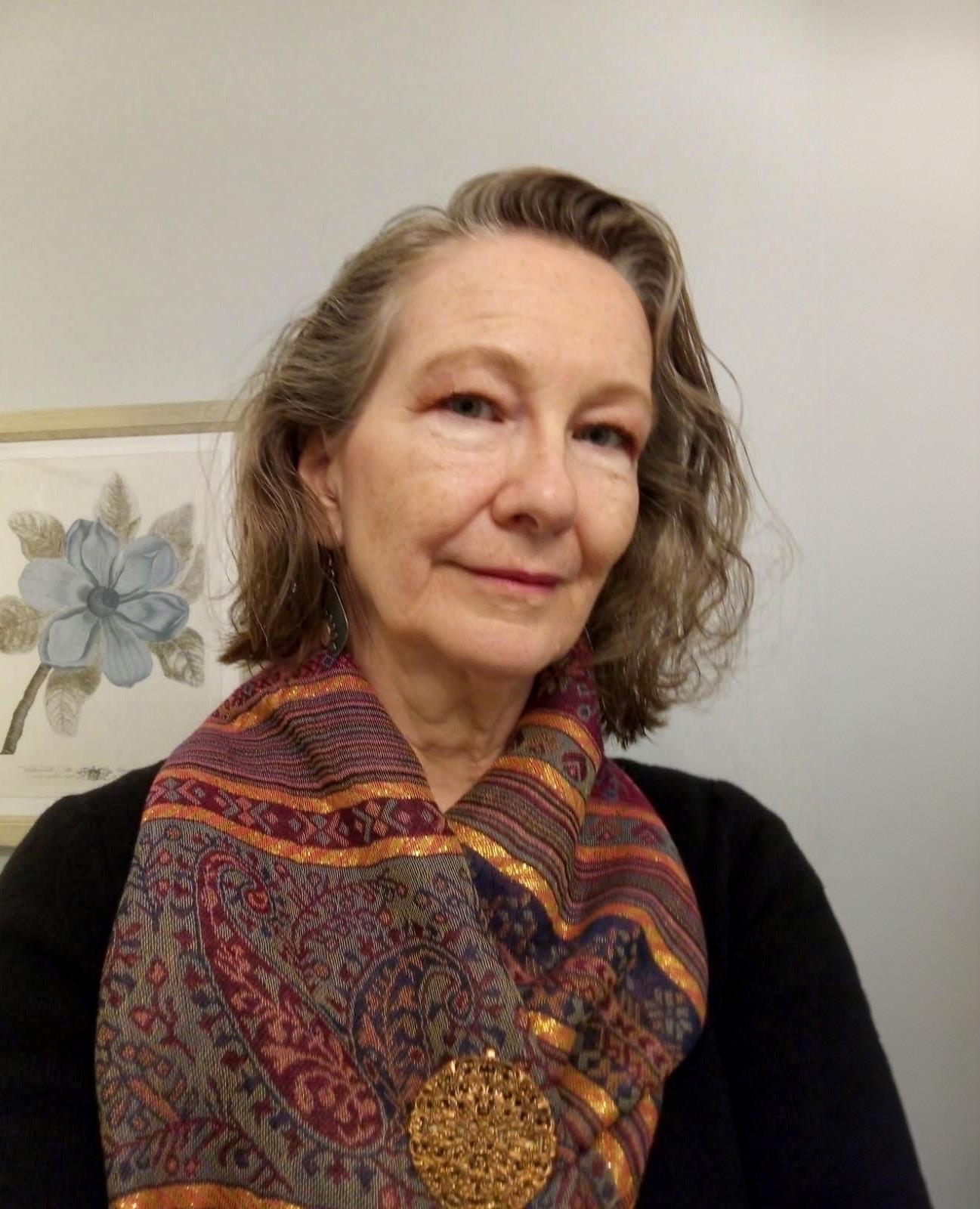
carried weight. “One employer was impressed,” she says, acknowledging that the degreein-progress gave her credibility in a world that often writes off people like her.
Looking back, she knows the program did more than give her an education — it gave her a connection to the outside world.
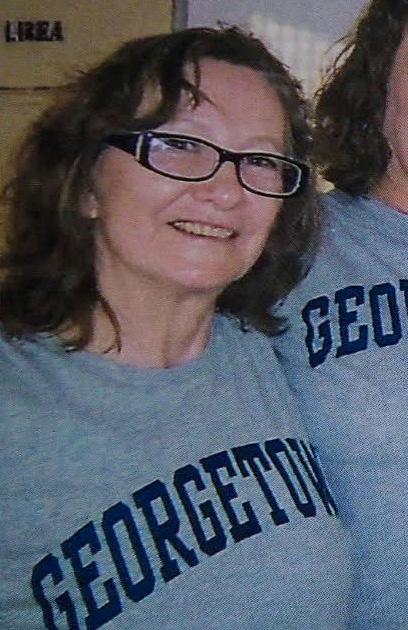
“It helped my transition out to have those moments in classes and study hall, to be emotionally and intellectually removed from where I was.” It showed her what was possible.
Rohn isn’t finished. “I want to continue my education,” she says, because now, after everything, she finally has the freedom to choose her own path.
“Everything could be taken away from you, except your power to choose how you’re going to respond to a situation,” said Colie “Shaka" Long, PJI program associate. Drawing from his reading of Viktor Frankl’s Man’s Search for Meaning in solitary confinement, Long is guided by a core mantra. “You’re never going to be powerless.”
Long’s journey to becoming a program associate with PJI began with a prison book exchange. Long drew from his readings of Frederick Douglass. Internalizing the idea that education is freedom, Long realized he needed to become a critical thinker. With no realistic expectation of going home, Long found inspiration in his readings. Despite the “atmosphere of apathy, hatred, pain, dehumanization and humiliation” Long experienced while in prison, he internalized a key message. “Regardless of the worst circumstances, I still have the power to be the best version of myself. When I embody that philosophy, I felt a sense of liberation that could never be taken away from me,” Long said. Long references an idea from Paulo Coelho’s The Alchemist — a belief that the universe will help one attain whatever it is they aspire to have. Long knew
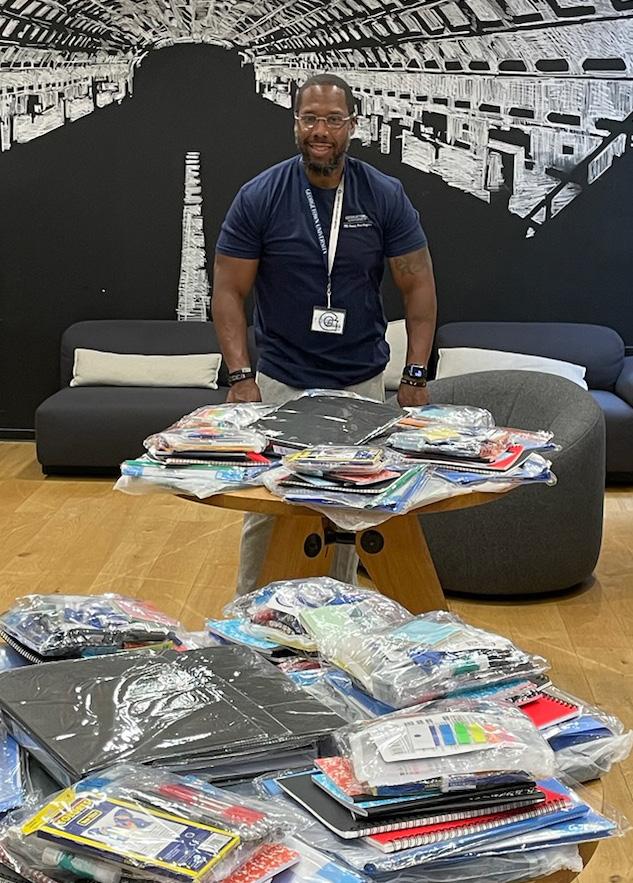
there was more in store for him than just walking free. “What I really want is not just physical freedom, but I truly want to add value to any space that I occupy,” he said.
Long has firsthand experience with the reentry process. “When you come home, having the skill set is only 15% of a successful reentry; the other 85% is your mindset,” Long said.
While much of PJI’s programming is a response to the collateral consequences of being justice-impacted, Long wanted to initiate a more preventive program, where “you don’t have to be justice-impacted, you can be inspired now,” Long said.
Hoping to work with youth, Long sought to create a family engagement program that would target the
cycle of incarceration and generational trauma associated with the criminal legal system. Having a formerly incarcerated grandfather and no stable father figure, Long viewed prison as almost like a “’rite of passage’ for Black boys in my community, like a ‘badge of honor’,” he stated.
This is when Long created the Family First Program — a program that curates and provides experimental trips and events for justiceimpacted parents and children. “Working with children is easier, but it’s just as easy to forget you can’t really focus on the kid at the expense of excluding the kid’s parents because the parents play a huge factor in what kind of character the kids will have,” Long pointed out.
One of the program’s first events was a Financial Literacy Lunch in September, facilitated by an investor and advisor who discussed generational wealth through investing and savings. The second event featured a brunch cruise, which was many of the kids’ and parents’ first time on a boat.
Long emphasized the importance of helping families create these memories together. “One of the participants even told me, ‘Wow, I really appreciate you including us; I really needed this. My kid’s been talking about it all day,’” Long shared.
Long and PJI staff members organized additional activities, including a holiday event filled with gifts for each child and a trip to local theme parks.
Next year, Long plans to coordinate Georgetown campus tours for families and allow undergraduates to share their experiences as Brown and Black students. “I want these kids, born and raised in D.C., to realize the opportunity to get a degree is right in my backyard,” Long said.
Family is at the core of Long’s mission. “Family stability creates community safety, and community builds a nation.”



The Mayor’s Office on Returning Citizen Affairs (MORCA)-Georgetown Paralegal Program helps returning citizens build meaningful careers in law. Through a six-month, hands-on curriculum, fellows learn the fundamentals of legal research, writing, civil and criminal law and professional ethics. Fellows also receive an hourly stipend while completing classes full time, allowing them to focus fully on their studies.
The program is a partnership between PJI, MORCA, and the Department of Employment Services (DOES).
This year, the program celebrated the graduation of the fifth cohort of the MORCA-Georgetown Paralegal Program, where thirteen fellows received their certificates from Georgetown Law. This achievement represents more than completing a challenging program — it is a reminder of why second chances are important.
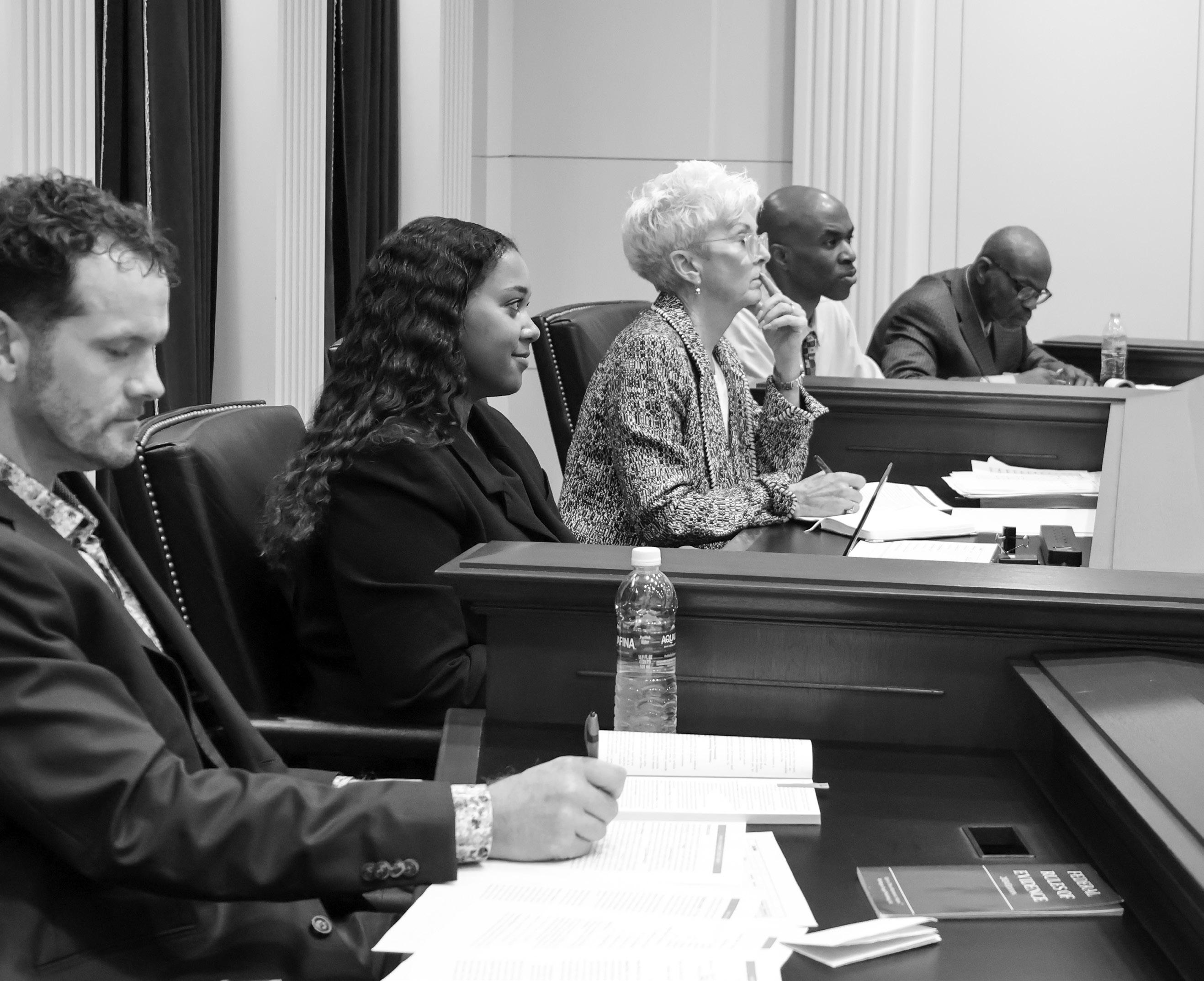


Each year, the MORCA-Georgetown Paralegal Program Fellows spend countless hours preparing for their capstone project — Moot Court. A culmination of concepts learned throughout the semester, fellows are presented with the challenge of teaming up in groups to participate in a mock court proceeding.
As part of the Moot Court project, students prepare legal briefs, build arguments, and then present oral arguments based on real-world legal issues.
For many, Moot Court is the first time they see themselves not just as students, but as true legal professionals. During the mock court proceedings, fellows finally have the chance to put their skills into practice in a room filled with family, friends and staff there to celebrate the hard work that goes into being a part of the program.
“The program demanded my best,” says Mark Davis, a MORCA-Georgetown Paralegal Program alumnus. “It required commitment, discipline and a complete shift in how I approached life. As a result, I gained legal knowledge and skills that have made me a capable paralegal and a valuable asset to any firm or agency.”

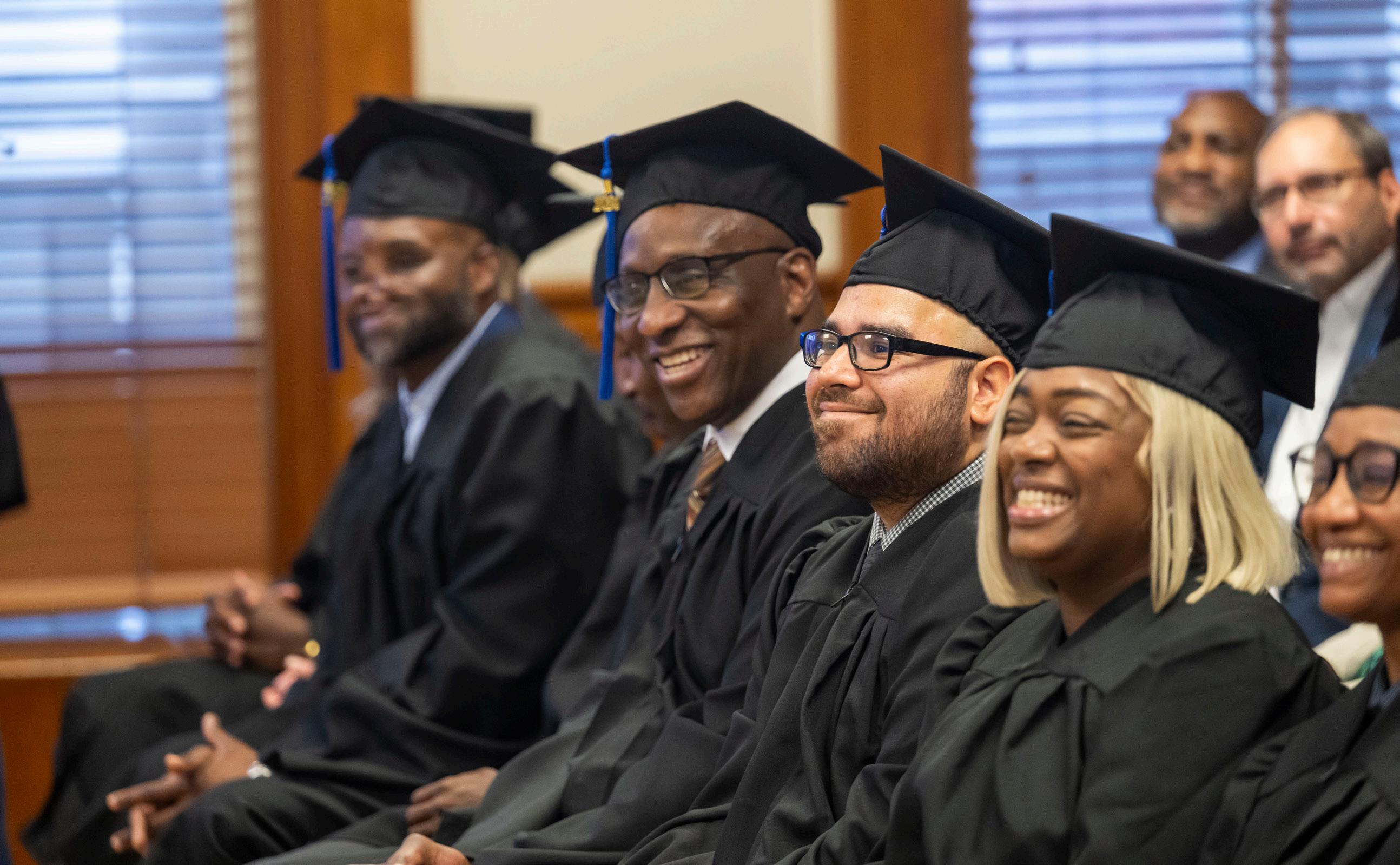
Thirteen fellows completed a certificate program through Georgetown University Law Center, surrounded by their family, friends, Georgetown faculty, staff and government partners who have supported their journey. Their graduation marked not only the completion of a rigorous 24-week program but also the beginning of new opportunities for these returning citizens who have dedicated countless hours to understanding the complexities of law.
The ceremony kicked off with remarks from Georgetown’s Prisons and Justice Initiative and Law Center staff, followed by a message from MORCA. The ceremony then moved into a personal story from the keynote speaker, Jake Tapper, CNN’s lead D.C. anchor and chief Washington correspondent. Tapper recounted how he and Charles “CJ” Rice, a 2024 Paralegal Program graduate, met in an unlikely way.
In 2011, at 17 years old, Rice was wrongfully convicted of a crime he did not commit. Tapper’s father, who had been Rice’s pediatrician, would later play a crucial role in proving his innocence by providing medical records that demonstrated Rice was physically incapable of committing the crime. Despite his eventual exoneration, Rice spent 12 years in prison.
Jake Tapper’s cover story in The Atlantic helped bring CJ’s story to national attention and shed light on the injustices of the legal system.
Tapper’s remarks at the ceremony highlighted the harsh realities many returning citizens face and emphasized the importance of programs like the MORCA-Georgetown Paralegal Program in helping individuals rebuild their lives.
“Your lived experience gives you a powerful and unique perspective. You understand the humanity behind every case file in ways few others can. That empathy, combined with your knowledge and skills, will make you an unstoppable force for change,” Tapper said. “What you do with the educational foundation you’ve built at Georgetown is now in
your hands. The same determination and resilience that carried you through this program will guide you through the next phase of your journey.”
During the ceremony, class representative Mark Ford took the stage with his own powerful message. Ford began his speech with deep gratitude and excitement for what lies ahead. Each graduate overcame incredible odds to complete the program, and what they accomplished was no small feat.
Ford went on to reflect on his experience in the program, highlighting Georgetown’s commitment to cura personalis, a Latin phrase meaning “care for the whole person.” He explained how this central tenet of Georgetown’s approach to education was not just a phrase but something the fellows experienced firsthand, as the program provided them with academic training and genuine care and support for their personal growth and future success.
Concluding his speech, he encouraged his fellow graduates with a call to action:
“From this moment forward, let’s keep our heads held
high knowing that we deserve a chance at success,” he said. “To all my fellow graduates, we can make a difference. We can achieve great things. And most of all, we will bring forth positive change.”
Many graduates are already leading the way for a more inclusive legal profession that embraces the talents of returning citizens. In fact, several graduates have recently secured positions at prestigious law firms and government agencies.
Marc Howard, PJI founder and director, commended the graduates for their inspiring achievements. “Both as individuals and as a team, you have inspired me and everyone else who has been lucky enough to interact with you,” he said. “In front of your close friends and family, I want to say that we are all so unbelievably proud of you and happy for you. You have earned this, and you deserve the new futures that you are creating for yourselves.”
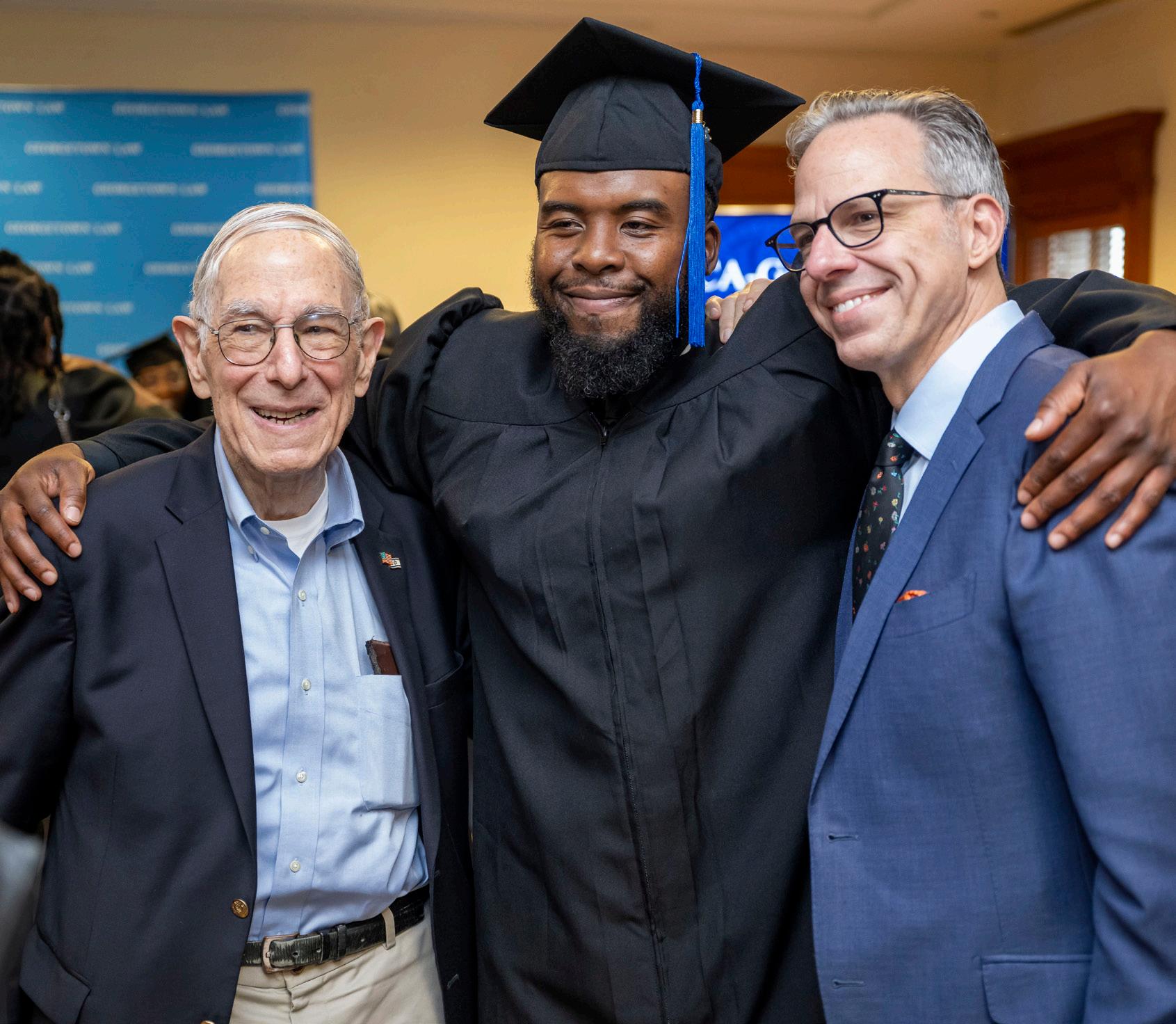
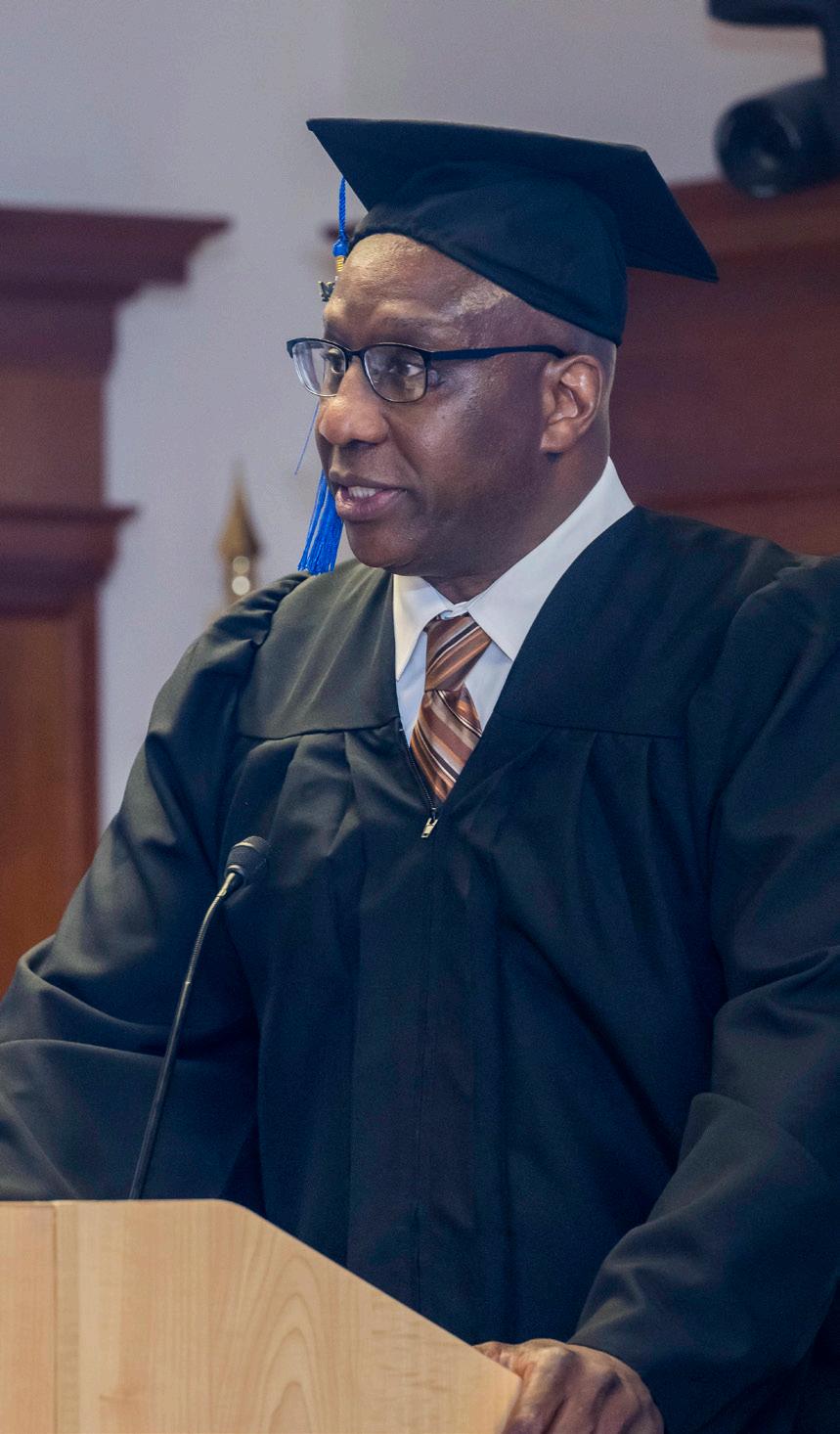
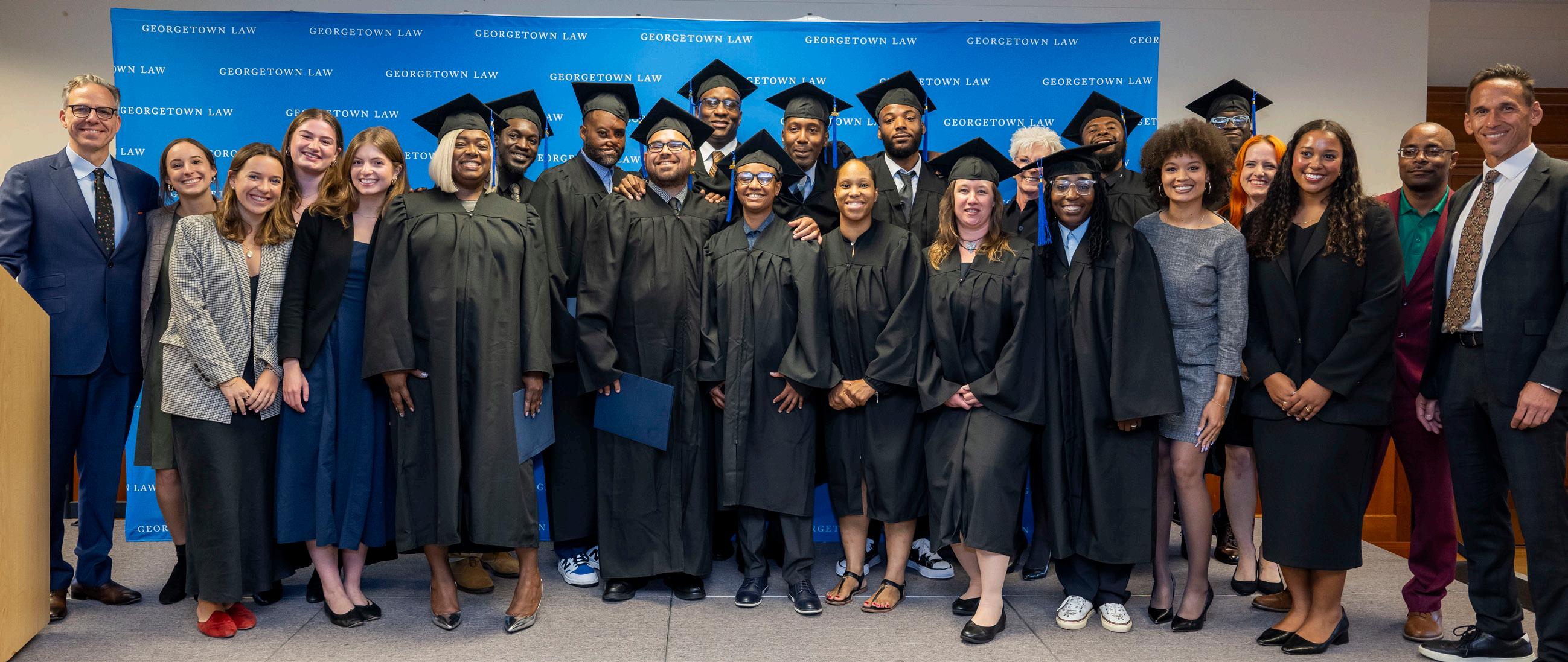





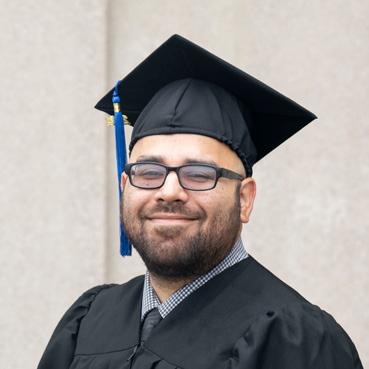

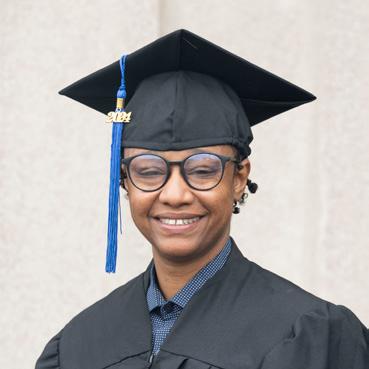


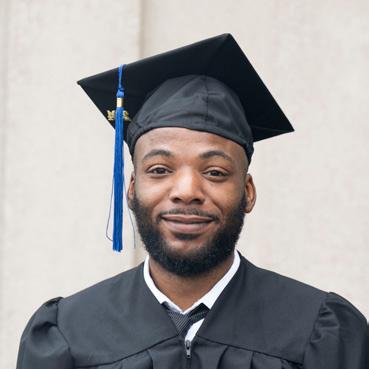



After returning home in 2015, Nicole Johnson faced the same challenge that many returning citizens encounter: finding meaningful employment that matched her skills and intellect.

“The stigma of having a felony conviction is real,” Johnson reflected. “Knowing about it is one thing — but experiencing it firsthand is something entirely different.” Despite her impressive skills and expertise, Johnson found that her past often overshadowed her qualifications, making it difficult to secure the opportunities she deserved.
Through her continued relationship with the D.C. Public Defender Service, Johnson learned about the MORCA-Georgetown Paralegal Program. She immediately recognized it as the opportunity she had been looking for since returning home — a chance to build a substantial career and give back by providing the kind of legal support services she once needed herself. The program proved to be both rigorous and empowering. From the demanding application process through the final capstone Moot Court project, Johnson and her cohort were fully immersed in an intensive legal curriculum. Throughout the program, Paralegal Program fellows learned complex legal concepts, wrote case briefs, memorandums of law, interrogatories and motions, and built a supportive network grounded in shared experiences.
“The program kept us mentally captivated,” Johnson said. “It pushed us to grow, build confidence and create future possibilities.” Through it all, the cohort formed lasting bonds.
Johnson's hard work paid off. Immediately following graduation, she was hired as a senior legal assistant with Legal Aid DC.
“I am tremendously grateful for the MORCA-Georgetown Paralegal Program,” Johnson shared. “They believed in our potential, invested in our success and saw us as more than a statistic.”
Today, Johnson is excelling in her career. She looks forward to seeing how the MORCA-Georgetown Paralegal Program continues to change lives — just as it changed hers.
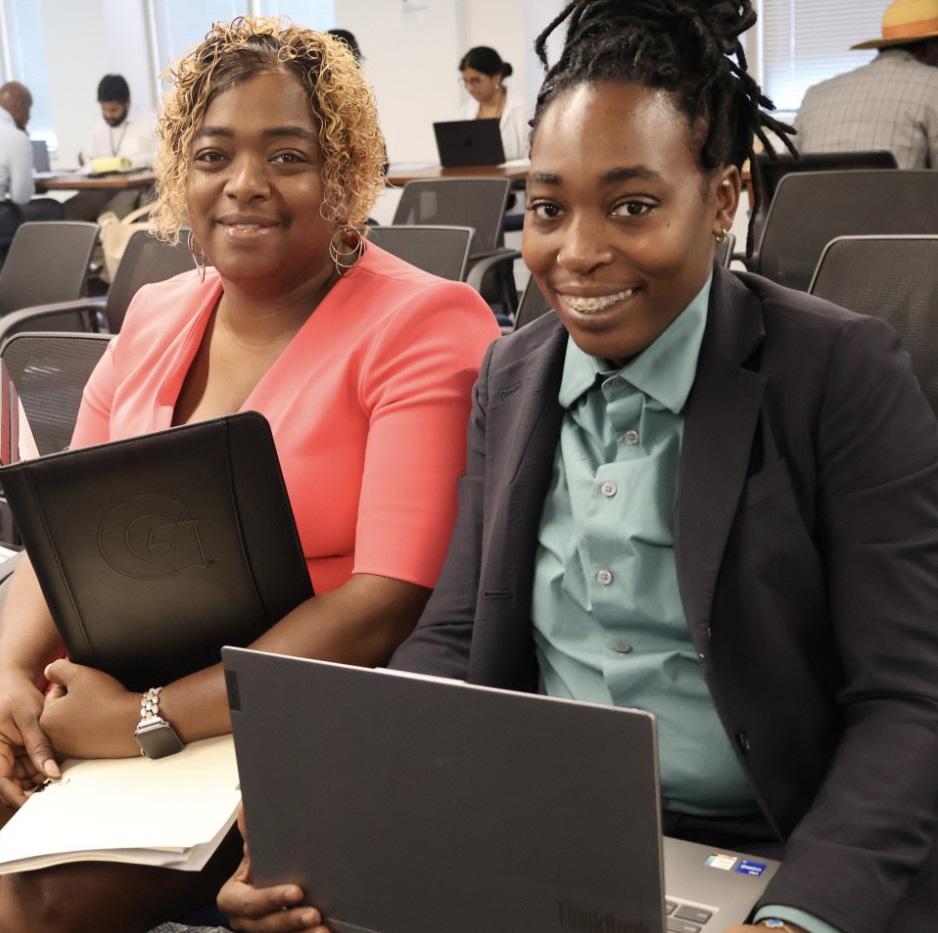


Overview
Since 2018, the Georgetown Pivot Program has provided a combination of classroom learning, handson work experience and leadership training to help fellows create their own pathways in the workforce and their communities.
Pivot is about removing the roadblocks that often stand in the way of people with past convictions. Too often, returning citizens are met with closed doors when seeking employment. Pivot works to change that by equipping fellows with the tools they need to succeed and by partnering with businesses to create fairer, more inclusive hiring practices.
Through a partnership with the D.C. Department of Employment Services, Pivot ensures that fellows receive an hourly stipend while completing their studies. This financial support allows them to focus on their education without the immediate pressure of finding employment. At the same time, Pivot builds bridges between fellows and a network of employers eager to tap into their skills and potential. “The broader mission of the Pivot Program is to change the way employers think about returning citizens and
The Pivot Program is grateful for the support of our 2024 intern hosts:
• Covenant House
• WeFit Eaton Corporation
• Astro Doughnuts
• 1863 Ventures
• Deloitte
• Center for Employment Opportunities
• Laundry Basket
• Link Strategic Partners
• Northern Real Estate
• Urban Ventures/ Project Community Capital (NREUV/ PCC)
• Department of Small and Local Business Development (DSLBD)
thus expand the range of opportunities that might be available to people who are returning to the community after incarceration,” Program Director Alyssa Lovegrove said.
For those who join the program, Pivot isn’t just about finding a job — it’s about building a future.
On June 13, the Georgetown Pivot Program celebrated yet another milestone as cohort six celebrated their graduation. After nine months of classroom learning and hands-on work experience, 14 returning citizens completed the program.
Family, alumni and supporters gathered to cheer on the fellows, sharing in their accomplishments and the journey that brought them here. Two graduates, Tariq Gaston and Damon Donelson-Bey, delivered powerful speeches reflecting on what the program meant to them.
“Pivot is more than a program. It’s a culture. It’s a way of life. It’s a family,” Gaston said. “This program changed my life and put me in a position where I can succeed in many different ways.”
Donelson-Bey took a moment to honor his mother, who was celebrating her first birthday with him in nine years. “She is my strongest champion, my advocate, my lawyer, my nurse,” he said. “I promise I am not missing any more birthdays.”
With 80 returning citizens now part of the Pivot alumni network, the program’s impact continues to grow. Graduates have gone on to launch careers, start businesses and become leaders in their communities.
The ceremony ended with a special tribute to Pietra Rivoli, who co-founded Pivot in 2018 and retired this year. She was honored with the Founder’s Award for her dedication and leadership. Reflecting on her time at Georgetown, she shared, “In my 40 years at Georgetown, this is what I’m most proud of leaving behind.”

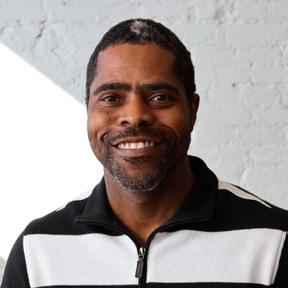

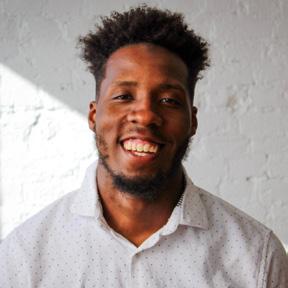


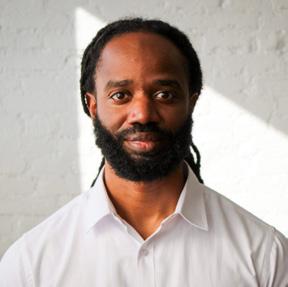


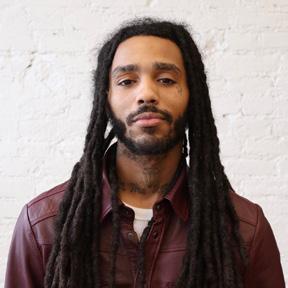

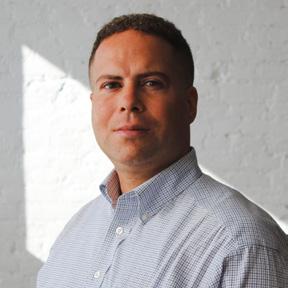

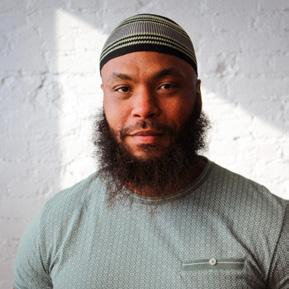
When Tariq Gaston thinks about where he is today, he can’t help but feel emotional. “I almost cry when I think about how far I’ve come,” he says. Just a year ago, he was coming home and trying to figure out his next move. He had always envisioned success for himself — he just needed the right tools and the right support to bring that vision to life.
That’s where the Pivot Program came in. Through working with the Pivot Program faculty and staff, Gaston learned to see even bigger possibilities for his future. “They didn’t try to change who we are — they helped us enhance our vision and realize what we could accomplish,” he says. They saw beyond what was on paper and challenged him to aim higher. Pivot gave him the confidence, skills and leadership tools he needed to turn his ideas into action.
Gaston excelled in the program — winning first place at the Pitch Competition and serving as a student speaker at the Pivot Program graduation.
After graduating from Pivot, he sharpened his focus and transitioned his earlier moving company into a thriving junk removal and valet trash service, working with apartment complexes across Washington, D.C., Maryland, and Virginia. His company now sends out three to four teams daily and has grown to nine employees — including his twin brother, whom he recently hired.
For Gaston, success isn’t just about numbers. It’s about the personal growth behind every milestone. “I hold myself to a high standard because I know there’s so much more in me,” he says. “I envision so much more for my future.”
Gaston continues to learn and build. Today, he works parttime at Link Strategic Partners, a Pivot employer partner, where he’s found mentorship, professional resources and a strong company culture that he calls “a blessing.” Watching how the CEO at Link engages with employees has given him a blueprint for how he wants to lead his own teams.
Gaston is one of many success stories from the Pivot Program. After welcoming a new cohort in fall 2024, we look forward to sharing more exciting updates about the growing Pivot alumni community.

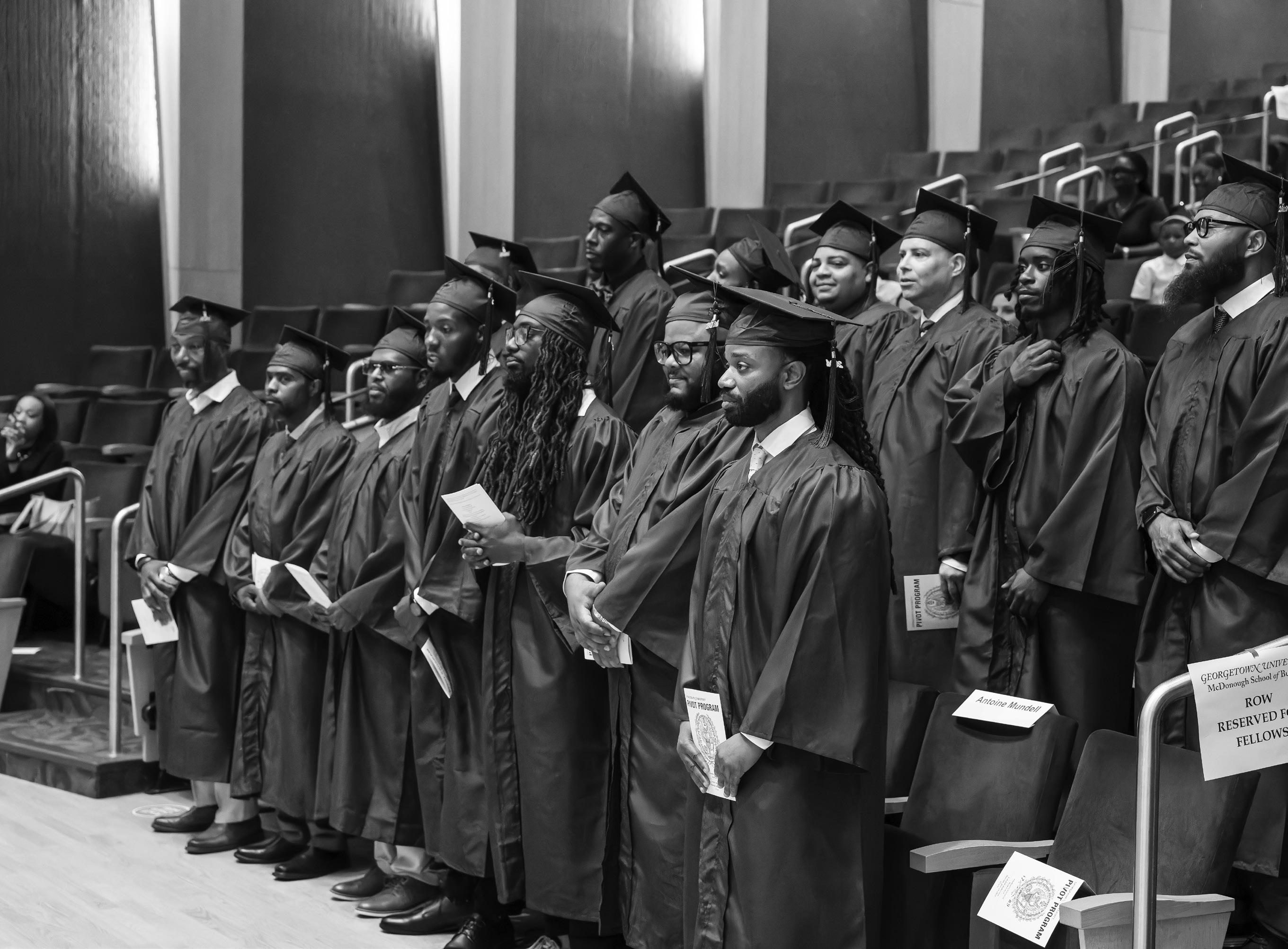
In October, the Georgetown Pivot Program welcomed its seventh cohort of fellows. For nine months, fellows will participate in a curriculum designed to build expertise in business management, entrepreneurship, and financial literacy.
A highlight of the Pivot Program experience is the internship component, which connects fellows with employers across various industries. These internships not only provide hands-on learning opportunities but also challenge perceptions about justiceinvolved individuals in the workplace. Alyssa Lovegrove, executive director of the Pivot Program, explains, “For many employers, the experience of having a Pivot intern on the team humanizes the issue. Second-chance hiring is much less daunting when you get to know someone who has been justiceinvolved, and that creates opportunities, not only for our fellows but also for other returning citizens.”
The launch of the seventh cohort underscores the Pivot Program’s ongoing commitment to creating pathways for second chances.

Overview:
For the seventh consecutive year, Georgetown undergraduate students dedicated their time and efforts to advocating for wrongfully convicted individuals. In 2024, 15 students took on the responsibility of reinvestigating five wrongful conviction cases, uncovering new evidence and bringing long-overdue attention to individuals still fighting for their freedom.
The course, offered through Georgetown’s College of Arts & Sciences, challenges students to do more than just study the criminal legal system — they actively work to change it. Each team of students creates a short documentary, launches an online petition and builds a website and social media campaign to amplify their case.
This year also marked the continued expansion of Making an Exoneree (MAE) beyond Georgetown. With guidance from the Georgetown team, Princeton students took on four cases of their own, adding to the collective effort to free the wrongfully convicted. This year marked the second year that Princeton offered the MAE course to its students.
Georgetown Law students also played a critical role in this year’s investigations. Through a practicum course taught by Marc Howard and Marty Tankleff — himself a former exoneree — they provided legal research and support, strengthening the undergraduates’ casework with legal strategy and advocacy.
7 YEARS
43 CASES 2 UNIVERSITIES
11 PRISON RELEASES
Gary Benloss
Sentence: 25 years to life
Time Served: 22 years
Donna Hockman Sentence: Life without parole Time Served: 16 years
Ronald Glenn Sentence: 50 years to life Time Served: 18 years
Amanda Lewis Sentence: Life without parole Time Served: 16 years
Damien Phillips Sentence: Life Time Served: 29 years cases in 2024
Robert Ochala
Sentence: Life
Time Served: 22 years
Tyrone Green Sentence: Life
Time Served: 30 years
Peter Kenney Jr. Sentence: Life
Time Served: 23 years
Anthony Mills Sentence: 35 years
Time Served: 18 years
This project was supported by Grant No. 15PBJA-22-GG-03927WRNG awarded by the Bureau of Justice Assistance. The Bureau of Justice Assistance is a component of the Department of Justice’s Office of Justice Programs, which also includes the Bureau of Justice Statistics, the National Institute of Justice, the Office of Juvenile Justice and Delinquency Prevention, the Office for Victims of Crime, and the SMART Office. Points of view or opinions in this document are those of the author and do not necessarily represent the official position or policies of the U.S. Department of Justice.
The MAE team celebrated the freedom of four wrongfully convicted people in 2024, which is the most in a single year since the program began in 2018.
Edward Martinez
Released: May 24, 2024
Time Served: 20 years
Anthony Mills
Released: Oct. 25, 2024
Time Served: 18 years
Gary Benloss
Released: Nov. 20, 2024
Time Served: 22 years
Rodney Derrickson
Released: Dec. 15, 2024
Time Served: 30 years
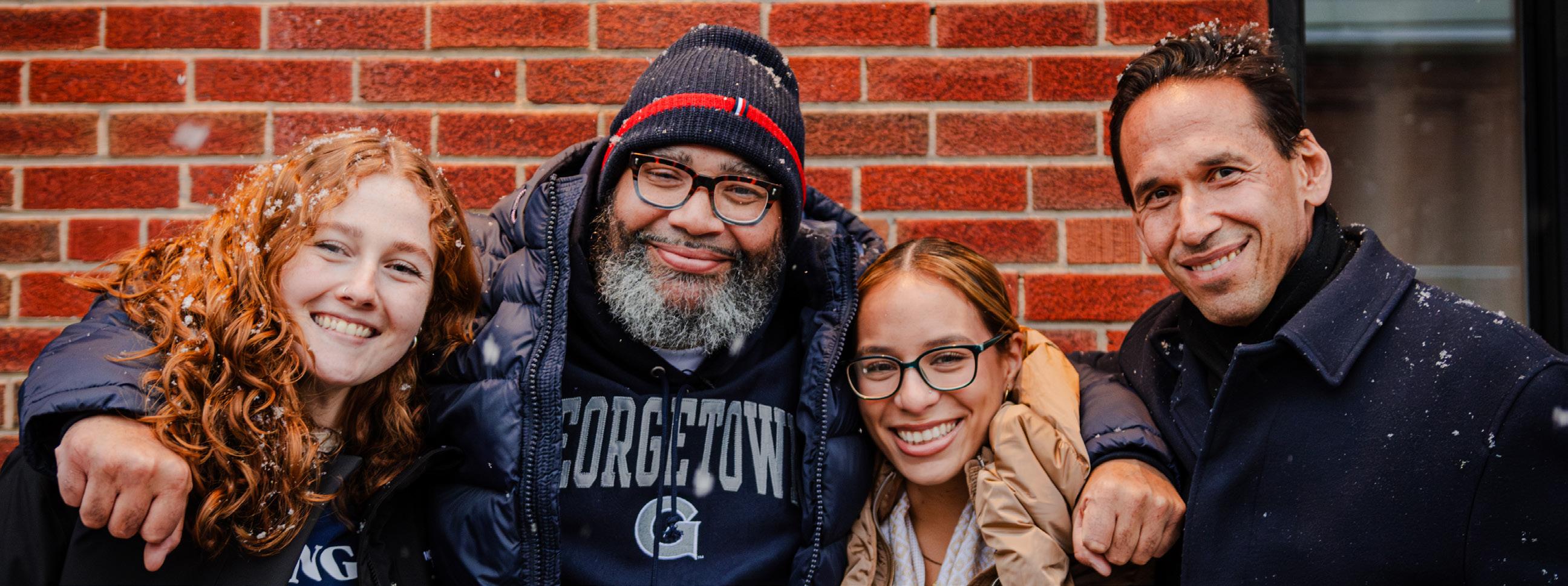
For incarcerated people and their families, the holidays can be a painful reminder of time lost away from loved ones. However, for the first time in decades, both Gary Benloss and Rodney Derrickson spent the holiday season reunited with their families.
Gary Benloss and Rodney Derrickson, who spent a combined 52 years wrongfully incarcerated, were released from prison just 25 days apart, becoming the 10th and 11th people to come home with support from the MAE program.
“In the past few weeks, I saw two groups of former MAE students, several years apart, drop everything in their lives to welcome home two incredible men,” PJI Director Marc Howard said. “This demonstrates the power of our program’s model based on student investigation and advocacy, and it gives me so much hope for justice and compassion.”

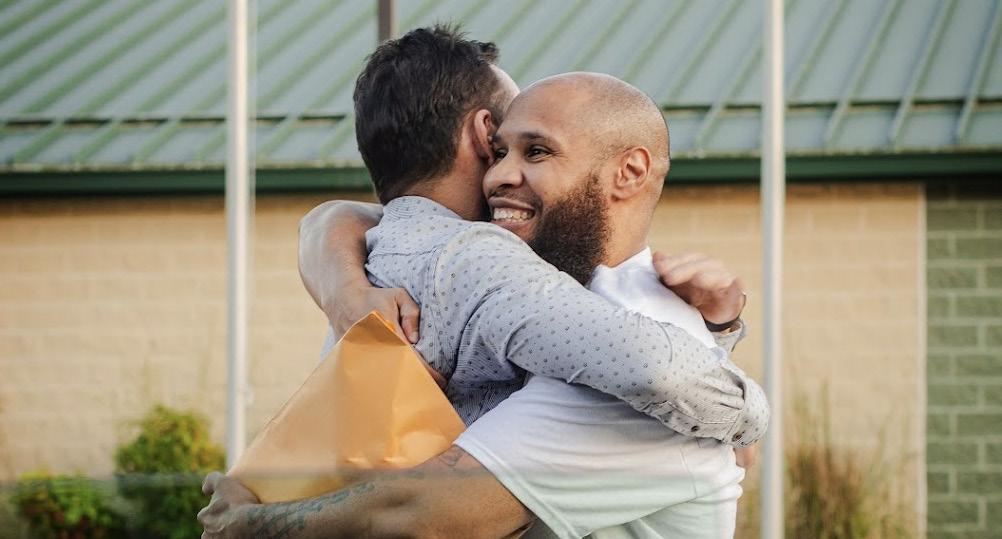
For Edward Martinez, May 24 has always been a day of deep personal meaning — marking the birthday of his daughter, Freedom. On May 24, 2024, that significance reached a new peak when, after more than two decades behind bars for a wrongful firstdegree murder conviction, Martinez was released from Northern Neck Regional Jail. Surrounded by family, friends and passionate supporters, this day marked the start of a long-awaited new chapter in his life.
In 2018, Martinez joined the inaugural cohort of the Georgetown Prison Scholars Program at the D.C. Jail — the beginning of his lasting connection with Georgetown University. In 2020, during the MAE course, a team of Georgetown students reinvestigated his case. Throughout the semester, Georgetown College of Arts & Sciences students Johnsenia Brooks (C’20), Cecily Burge (C’21) and Austin Riddick (C’20) dedicated countless hours to reinvestigating Martinez’s case. “It was an honor to be able to work with Edward, alongside Austin and Cecily,” says Brooks. Their commitment to proving his innocence led to the creation of an award-winning short documentary
that exposed the layers of injustice culminating in his wrongful conviction. The students’ support of Martinez arrived just when he was beginning to lose hope. “They came into my life at a time when I felt defeated by the legal process,” says Martinez. “They understood me and never made me feel like I wasn’t worth the time or effort.”
His legal journey was bolstered by a promise kept. Former student Austin Riddick — along with counsel Janai Reed and professors Marc Howard and Marty Tankleff — joined Martinez’s legal team after vowing never to give up on his case. Their collective commitment, combined with Martinez’s own steadfast self-advocacy, was instrumental in securing his release.
Today, Martinez is a fellow in the Georgetown Pivot Program — a program dedicated to supporting returning citizens in their reintegration and personal growth. After enduring years of isolation and injustice, he is determined to rebuild his life and improve the lives of others facing similar struggles.

Bureau of Justice Assistance
D.C. Department of Corrections
D.C. Department of Employment Services
D.C. Jail
D.C. Office of the Attorney General
D.C. Office of Victim Services and Justice Grants
Mayor’s Office on Returning Citizen Affairs
Maryland Department of Public Safety and Correctional Services
Patuxent Institution
Georgetown University College of Arts & Sciences
Georgetown McDonough School of Business
Georgetown University Law Center
Arlington County Detention Facility
Wider Circle
Suited for Change

Shining Star Awards: PJI staff and alumni were recognized at the Department of Employment Services Shining Star Awards. The MORCAGeorgetown Paralegal Program received the 2024 Partner Recognition Award. MORCA-Georgetown Paralegal alumni Alfred Miller and Lesa Campbell were named 2024 Rising Stars, and Georgetown Pivot Program alumnus Joe Houston was honored with a 2024 Shining Star Award.
PJI Summer Cookout: Hains Point Park once again set the scene as PJI staff, faculty, alumni and their loved ones reunited for a summer tradition, now in its third year.
Family First Program Adventure: Participants in the Family First Program enjoyed exciting outings this year, including a visit to LEGO® Discovery Center Center.
Winter Leadership Weekend: PJI welcomed the Board of Regents to its offices for Winter Leadership Weekend. A panel of PJI staff and program alumni led a compelling discussion that highlighted the impact of our work and the voices driving it forward.



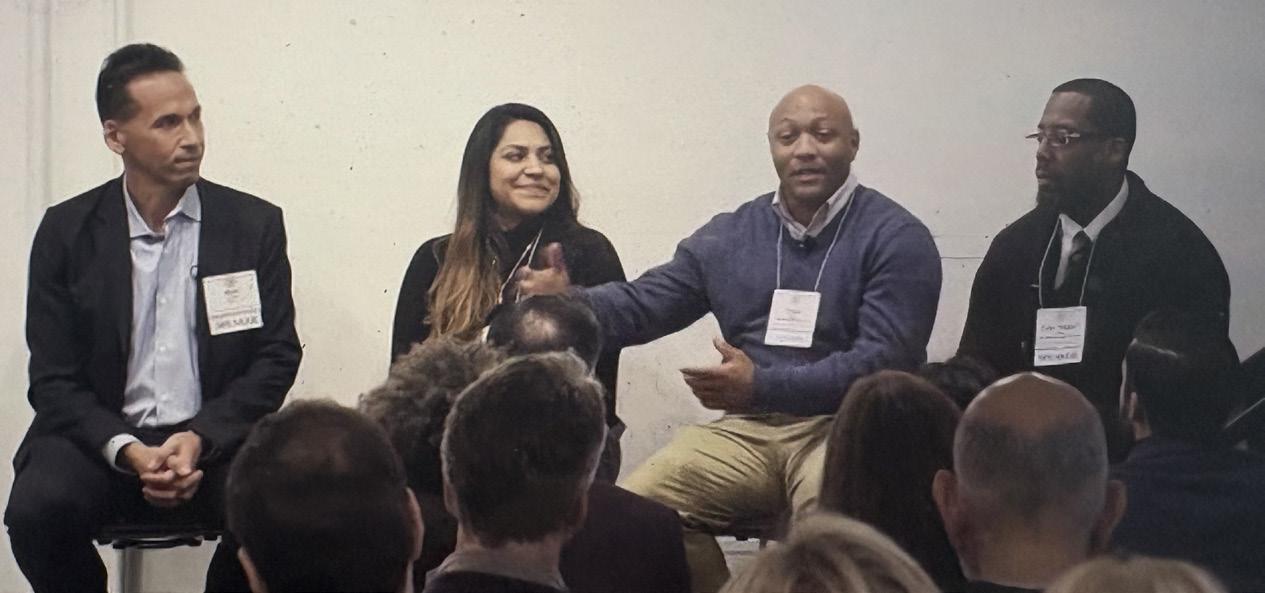
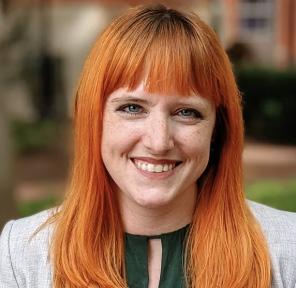
CAITLIN CHAMBERLAIN
Deputy Director
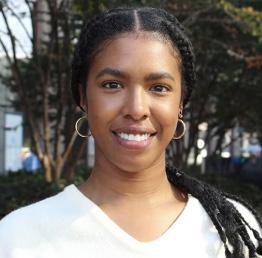
VALERIE COATS Program Manager, Prison Scholars Program

VIRGINIA HILL
Director of Operations
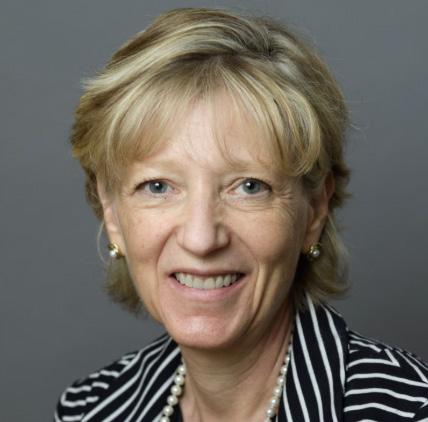
ALYSSA LOVEGROVE
Executive Director and Academic Director, Pivot Program
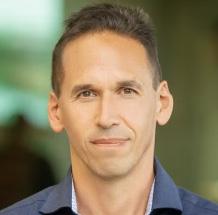
MARC HOWARD PJI Director and Professor of Government and Law

LATASHA MOORE Assistant Director, Pivot Program
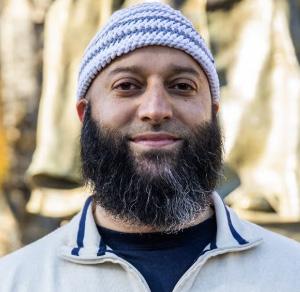
ADNAN SYED
Administrative Coordinator
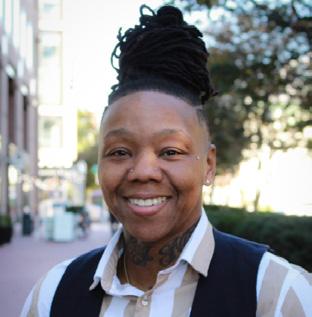
TYRONDA FERRELL Administrative Coordinator, Pivot Program
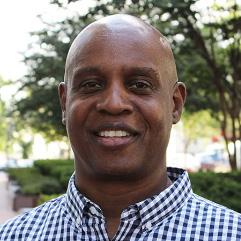
ARLANDO “TRAY” JONES III Program Associate

EMILY HAINZE
Assistant Teaching Professor, Bachelor of Liberal Arts Writing Program Director, and Associate Director

AMANDA LEWIS Research Associate, Adjunct Lecturer
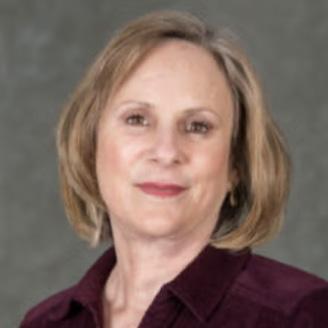
PIETRA RIVOLI Founding Director, Pivot Program

MARTY TANKLEFF
Peter P. Mullen
Distinguished Visiting Professor

MAYA HAMBRICK Paralegal Program Manager
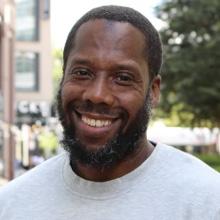
COLIE “SHAKA” LONG Reentry Coordinator

JULIA REINACH
Executive Assistant to the Director, General Project Coordinator

SHANESSA TAYLOR Director of Communications
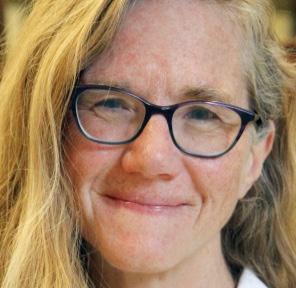
KATY RYAN Director of Education, Teaching Professor

TYRONE WALKER Director of Reentry Services
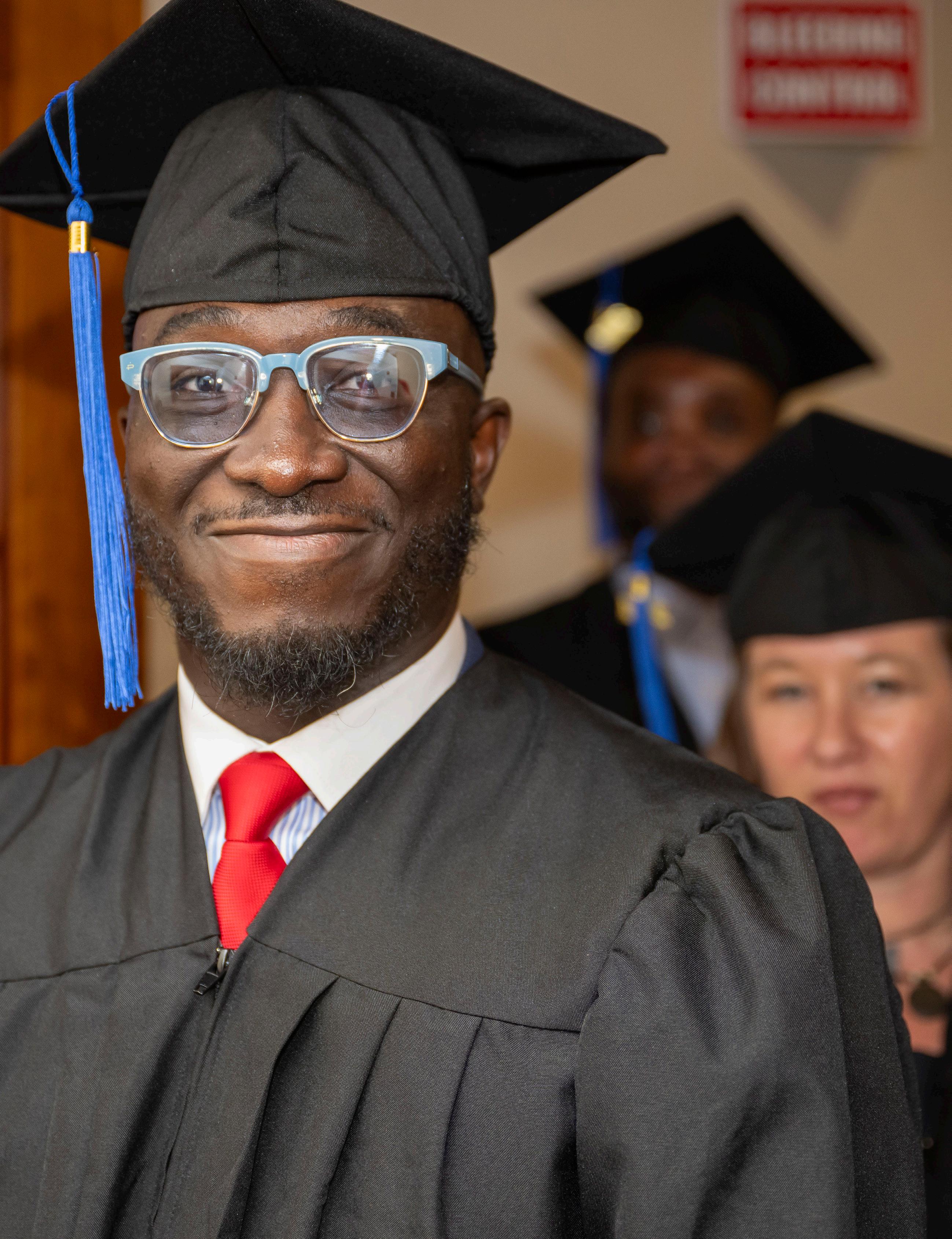

Rodney Derrickson, a 2021 Making an Exoneree program participant, celebrated his return home on December 15, 2024.